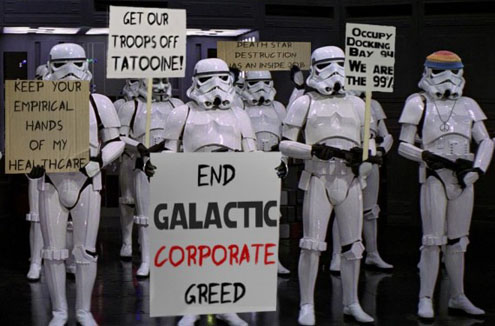Monthly Archives: November 2011

Per Bakadesuyo:
A total of 68 15-min. observations of customers’ behavior at a food supermarket suggests that only about 7% of shoppers observe the item limit of the express lane. The averages tended to be about four pieces.
I’d be curious to know the methodology on this. This doesn’t even make sense to me.
If they were measuring people that had more than 10 items, surely more than 7% went through the regular checkout lane by default. Express lanes are usually a minority.
If they were measuring people with 11-15 items, that might make more sense, but how many people have 10-15 and is it enough to really draw from? When I go to the market I usually only have a couple items or a ton.
I may have broken the rule yesterday, though. Our local express lane is actually 15 items and I had… roughly 15. I didn’t check. There was nobody in the express lane. The usual excuses for scofflaws, I suppose. Nobody said anything!
Megan McArdle tweeted yesterday about the dangers of going to the pharmacy on the 1st of the month. I didn’t think anything about it until I was told there was a 90-minute wait yesterday. That’s pretty unusually high, so I guess there is something to it.
Do other nations have pharmacies like we do? Where pharmacists get paid a lot of money to handle the drugs? I must confess some ignorance as to the necessity of all that. My sister-in-law is a PharmD (pharmacist with a doctorate). I should ask my wife. I haven’t seen her but for bits and pieces lately, though.
The image above is from the TBS TV show 10 Items Or Less. It’s funny in little bits, but there’s only so much entertainment to be had in watching a show focused around such… uhmmm… people that have not lead successful lives due at least in part to rather poor judgment on their part.
Does the NFL lean to the right? Well, its fans do at least a little (owing probably as much to the gender split as anything else). The numbers in this article, though, are kind of worthless because they include political donations by the owners. The owners’ donations outstrip those of the players and everybody else by a pretty large margin. Not exactly representative.
Kevin Drum has a couple of really good articles on the Mac/PC wars. I used to lament that Microsoft was so dominant, then the iPhone showed me how much worse it could have been if Apple had won and playing around with Linux demonstrated that Apple might have won, if Microsoft hadn’t.
Online housing discrimination is typically done not in renter/lease situations, but rather roommate situations. This actually brings up an interesting philosophical question: Where do you draw the line? It’s easy to sympathize someone wanting to live with someone like them, if they’re living together. It’s harder to sympathize with an apartment landlord that only wants a certain kind of tenant (making it much harder for others to find decent housing). But what about a basement apartment? What about a lease-while-I’m-out-of-the-country sort of situation?
The problem with crime and punishment in America. The latter case is particularly heartbreaking, where the guy turned himself in. The most cynical interpretation is that he did it all for three hots in a cot. That’s heartbreaking in its own way.
According to a study, loosening DRM restrictions can decrease music piracy. It becomes an unfortunate thing when doing things the illegal way is not only cheaper, but easier than the legitimate way. Microsoft, I’m looking at you.
What happened to the 30-hour workweek, which was right up there with the JetPacks? I didn’t know this, but the Senate actually passed one in 1933, but it didn’t gain any traction in the House and it was a bridge too far for Roosevelt. On the one hand, I vaguely worry about reaching a post-employment age where some sort of maximum workweek would be required just to keep people working (though I have been assured this is impossible). On the other hand, it seems inconducive to international market-competitiveness.
Somewhat along those lines, Brian Arthur ponders that we’re moving from a production economy to a distribution economy.
An interesting story about a frustrated author who threw unused copies of his book away only to find them resurface on Amazon.
You know those really low interest rates you hear about? Yeah, who is actually getting those?

